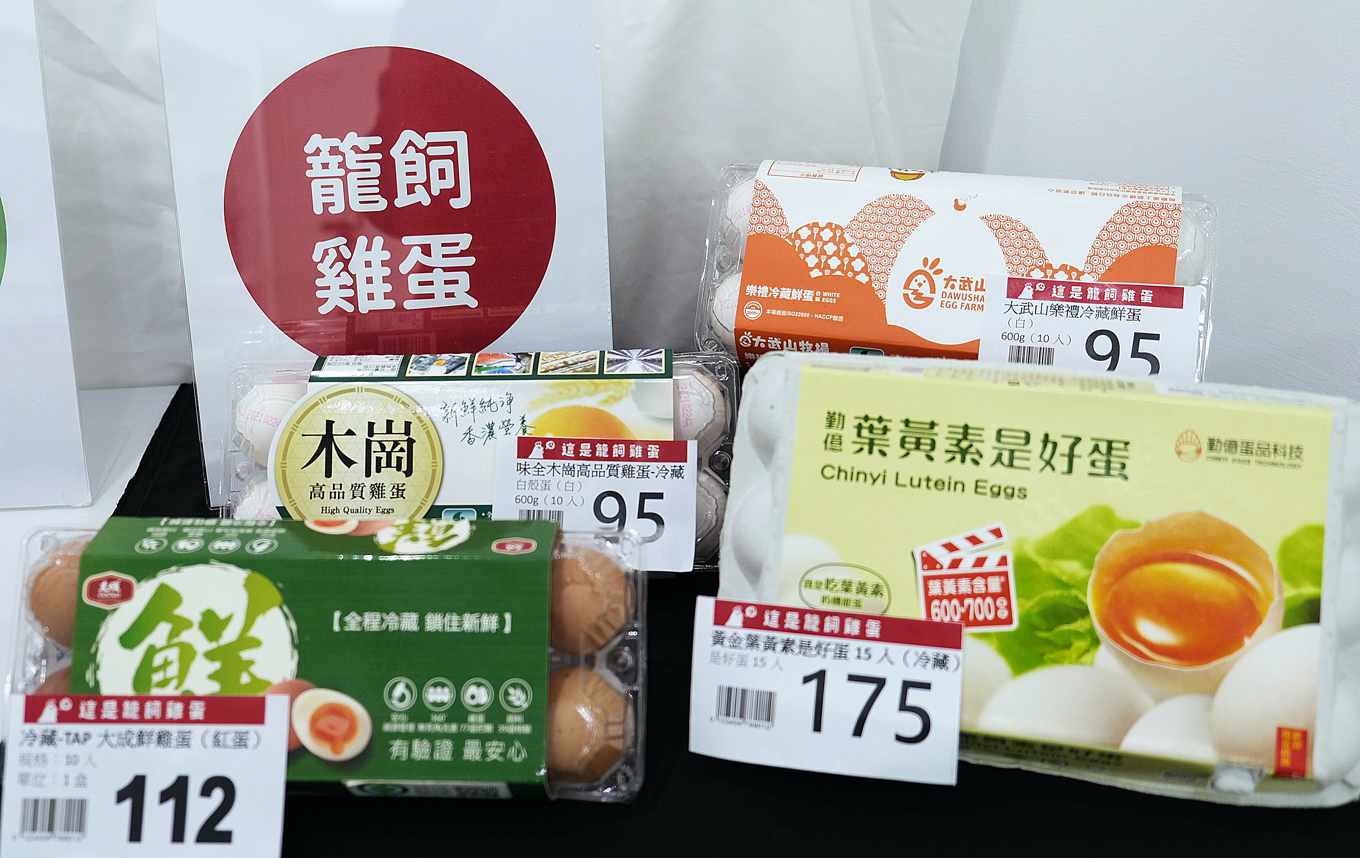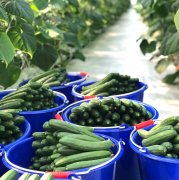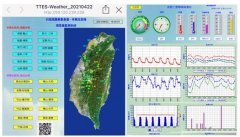To promote the welfare of laying hens, Carrefour will only sell non-cage-fed eggs from 2025.
In order to improve animal welfare, Carrefour supermarket and Taiwan Animal Society Research Association (hereinafter referred to as "Animals Society") jointly announced today that all Carrefour outlets and supermarkets will only sell "non-cage-fed eggs" from 2025.
Chen Yumin, deputy chief executive of the Action Society, thanked Carrefour for being a pioneer in the industry, and also pointed out that the European Union and other Asian countries already had advanced policies on layer welfare, questioning Taiwan's lack of corresponding policies and providing guidelines for industrial upgrading. The Animal Husbandry Department of the Council of Agriculture said that it has announced the draft that in the future "eggshells" will be sprayed with production mode codes to provide consumer identification. However, when the reporter actually interviewed a number of consumers, most of them said that they would not open the egg box to inspect the eggs, let alone remember the code identification, and suggested that it was more feasible to indicate the mode of production directly on the egg box.

Only when laying hens live in a natural environment can they meet animal welfare and contribute to the health of the Chinese people. (photo courtesy of / agency)
Carrefour is concerned about animal welfare and will stop selling caged eggs in 2025.
"Taiwan eats more than 7 billion eggs a year," says Su Hsiao-Chen, director of corporate social responsibility and communication at Carrefour. How did so many eggs come from?. It deserves everyone's attention. At a time when the global animal husbandry industry is developing towards a sustainable goal, Taiwan's laying hen industry still cares more about output value, and the hidden risks of zoonotic diseases, food safety, and environmental sustainability will be shared by Chinese people in the future.
To this end, since 2018, Carrefour, in cooperation with the Action Society, has led the domestic channel and gradually completed the "non-cage feeding egg zone, self-brand flat feeding eggs, strict selection of grazing eggs". Today, it has even promised to completely stop the sale of caged eggs in 2025. at the same time, we will actively promote brand suppliers to move towards the same goal.
"in 2018, people may not believe that this will be a success, but the cage eggs will certainly be completely eliminated, and we have to take action. Su Xiaozhen is grateful to the transformed egg farmers, academics, agencies, and all the shops who use non-cage-fed eggs, especially to consumers for their recognition, which has led to a continuous increase in the proportion of Carrefour's non-cage-fed eggs. During the epidemic, non-cage-fed eggs are sold out of stock.
Both the European Union and Asian countries have policies on the transformation of "caged eggs", but Taiwan is still taking a step forward.
It is better to spend money on healthy food than to spend money on a doctor.
Chen Yumin points out that if economic animals are not treated kindly, human beings will not be able to get safe food. Although the nutritional value of cage-fed and non-cage-fed eggs is the same, at first glance, cheap eggs seem to be more cost-effective, but if weak laying hens are raised in cages, if diseases are culled on a large scale, the economic losses should be spread out on the cost of each egg. Not to mention because caged hens cannot remove parasites such as feathers through sand baths, pesticide must be sprayed in the henhouse, resulting in the production of "fenpril remnant eggs", which is harmful to consumers' health.
Chen Yumin said that the price of friendly eggs is not necessarily higher than that of caged eggs. Chen Yumin points out that the price of about 70% of eggs falls at 7-12 yuan per egg, while that of friendly eggs is about 9-15 yuan per egg. She called on consumers to choose carefully and spend wisely, support friendly animal-friendly egg farmers and take care of their own health.
With the advent of the era of economic animal scrapping, Taiwan's policy is like a bull's step.
Chen Yumin also pointed out that the European Union completely banned the use of lattice cages to produce eggs as early as 2012, and announced in June this year that it would introduce a bill by the end of 2023. It is expected that in 2027, the inhumane way of captivity and feeding of economic animals in the EU will be completely abolished, and "the era of scrapping economic animals will officially come."
At the same time, Asian countries have never stopped the pace of "abolishing caged laying hens". In 2011, South Korea established a certification system for economic animal welfare standards; in 2021, Thailand set the production standard of non-cage-fed eggs and introduced the certification of non-cage-fed laying hens, hoping to increase the market share of non-cage-fed eggs year by year; also in 2021, the Philippines established the Philippine National Standard for non-cage feeding.
Although Taiwan has also made efforts in the welfare of laying hens, for example, in 2015, the Council of Agriculture issued the definition and guidelines for friendly production of eggs, encouraging egg farmers to change to flat feeding, grazing or rich cages according to the guidelines, in the same year, Article 25 of the Food Safety Law was amended, it is stipulated that friendly eggs should be marked with "flat feeding", "grazing" or "rich cages" on the outer packaging; however, non-friendly "cage feeding" eggs do not need to be marked.
In 2016, the Council of Agriculture also provided low-interest loans to encourage the transformation of egg farmers, but Chen Yumin questioned that since 2015, the Council of Agriculture has not been able to put forward policy guidelines like the European Union, and will only thank the public for their push. It is hoped that the timing of abolishing lattice cages will be decided by the power of consumers. "clearly aware of the international trend, the Council of Agriculture does not have a vision or policy to lead industrial progress. Chen Yumin expressed regret.
According to the draft of the Council of Agriculture, the mode of egg production can be known from eggshells in the future.
Cheng Chu-ching, head of the Animal Protection Section of the Animal Husbandry Department of the Council of Agriculture, responded that the government is very concerned about the welfare of economic animals, "but the most important sticking point is the needs of consumers." Cheng Chu-ching stressed that efforts should be made on consumer education and initiatives. when consumers want non-caged eggs, the market will naturally respond.
However, when the reporter further asked the government what work the government had done to educate consumers, Zheng Zhujing responded that the design and input of any system had administrative costs, and the government could only implement it steadily according to budget and quantity. "in fact, there has always been a discussion about how to mark eggs. If you need to propose a certification system, you can also communicate with the relevant team. "
Chen Yumin then pointed out that at present, the Food Safety Law only stipulates that friendly eggs should be marked as "flat feeding", "grazing" or "rich cage" in the outer package, but not "cage-fed eggs". As a result, many caged eggs claim to have added lutein, Ganoderma lucidum, or put pictures of running hens on the packaging, making consumers mistakenly think that they are good eggs worth buying at a high price. "We protested with the Council of Agriculture for a long time. Consumers do not get equal information. "
These cage-fed eggs are derived from physically and mentally abused laying hens. The agency calls on consumers to support "non-cage-fed" eggs and safeguard the welfare of laying hens. (photography / Yang Yuyun)
In the future, the code will be sprayed on the eggshell: it is more convenient to mark it in Chinese on the egg box.
Cheng Junlong, head of the Poultry production Section of the Animal Husbandry Department of the Council of Agriculture, responded that the government has formulated "designated fresh eggs as the agricultural products that should be registered with traceability information and the items and labeling methods that should be registered." in the future, washed fresh eggs sold in campus ingredients, national army non-staple food, supermarkets, supermarkets, shopping malls and online shopping channels need to be logged into the "Taiwan Egg traceability platform system" before circulation and sale. And print the code name on the eggshell, then consumers can distinguish the mode of production of eggs.
Recommended reading
Food an
Taosong is afraid of damaging the brain of the fetus and causing hyperactivity in children, which is banned in the European Union and the latest judgment in the United States calls for stricter regulation or prohibition.
May 17, 2021
However, the so-called "sign" of the livestock department is to spray two rows of numbers on the eggshell. The first column has 6 yards, numbering the livestock farm and washing plant, and the second column has 7 yards, 1-6 yards as the packing date. The 7th code represents different modes of production, R: grazing production, F: flat feeding production, E: enriched cage feeding production, C: general cage feeding production.
Consumers say, how to remember the code of these laying hen production methods?
The problem is that the eggs are put in the box, if it is a transparent plastic box, you may also see that many cartons will also add envelopes on the outside, unable to take a closer look at the eggshell signs. Moreover, when consumers choose to buy in supermarkets, they have to keep in mind or query the meaning of different codes, which fundamentally loses the simple and easy-to-understand principles that labels should have.
In a street poll conducted by "upstream and downstream", it was found that most consumers were not in the habit of opening egg boxes and checked out directly, while others said that "the meaning of the code name should be stated next to the cabinet, because without publicity, it will be difficult for consumers to remember the number." Another consumer pointed out more bluntly: "instead of learning to remember the number, it would be better to mark it in Chinese on the egg box at the beginning: grazing production, flat feeding production, rich cage feeding production, and general cage feeding production. "
Committee of Agriculture: the draft is still in the announcement period. If you have any suggestions, you can express it.
Cheng Junlong said that the label of friendly eggs on egg boxes was based on the Food Safety Law. Later, some people reflected that eggs might be "stolen from the sky" and that each egg should be marked correctly. That is why this year, in accordance with the "rules for the labelling of Agricultural products," every eggshell is required to be spray printed. If you must mark "cage-fed eggs" on the egg box, you need to amend the Food Safety Law. Cheng Junlong pointed out that the regulation of eggshell spray printing is still during the announcement period, and if members of the public have any suggestions, they can express them on the draft platform.
As to whether the government has made great strides in forcing friendly breeding or abolishing cage feeding because of the backlash from cage breeders, Cheng Junlong stressed that there is absolutely no such thing. "as long as consumers have demand, the industry will follow suit. He believes that consumers have the power to change the market.
- Prev

Cucumbers are naughty and difficult to deal with. Lin Kaiyao, a green farmer, uses science and technology to solve the problem of cucumbers.
About the description of the cucumber, it is generally said that the cucumber is sweet, crisp and refreshing, but have you ever heard that the cucumber is "very naughty"? That's right! Lin Kaiyao, a green farmer, said that the cucumber is an animal in the skin of a plant, and it is a kind of very skinny animal, which he once set up.
- Next

Establishment of Tea production Management Information platform for Tea conversion Plant Management of EASY for Tea Garden
The Tea Industry improvement Farm (Tea improvement Farm for short) has set up a "Tea production Management Information platform" to provide immediate, historical and early warning meteorological data of major tea areas in Taiwan, as well as monthly update of management information of 10 tea gardens in five major tea areas. provide including the current growth status of tea trees, estimation
Related
- A one-day flower show brings 130 million yuan in orders! Nanhai, this Phalaenopsis exhibition is amazing
- What do the flower language and meaning of Lutheran tree mean? Precautions for planting Lutheran tree
- Encounter Chaoshan Kongfu tea, not without this cup of Phoenix single clump
- The durian market in Vietnam and Thailand is flooded. The price of imported durian has plummeted by 30-40% in a month.
- Shanghai solved the problem of local vegetable supply by planting 80,000 mu of green leafy vegetables.
- Wageningen University has become the best agricultural university in the world for the seventh time in a row.
- The strongest export season of South African grapes is full of challenges, with exports to Russia falling sharply by 21%.
- Sri Lanka is on the verge of bankruptcy, "Tea for debt" Organic Agriculture Revolution aggravates the Food crisis?
- Turning waste into earthworm manure and worm manure into organic fertilizer-A new choice for auxiliary farming
- Organic rice growers shoulder the responsibility of nurturing agricultural talents! Yinchuan Sustainable Farm with Organic Life Camp

